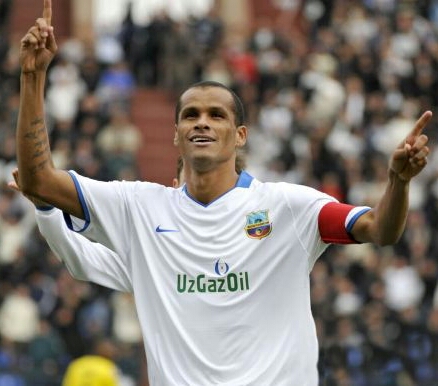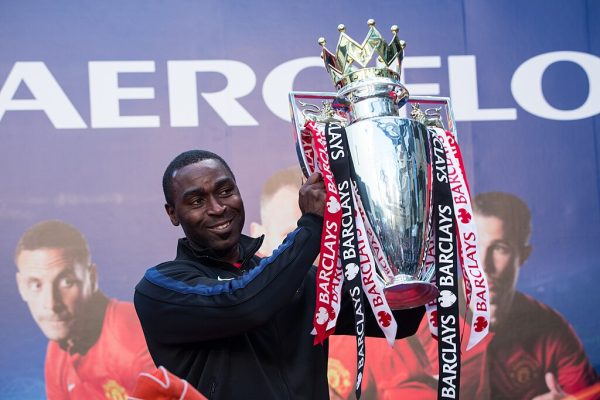What do Zlatan Ibrahimovic, Loco Abreu, Rivaldo, and Andy Cole have in common?
Beyond the fact that they are all footballing legends, another thing that connects these four men is the title given to the “type” of player they are. This title is “journeyman.”
The sports slang term “journeyman” refers to a player who plays for many clubs throughout their career, the complete opposite of a “one-club” man who stays his whole life at just one club.
Journeymen are a common type, and throughout the ages, we have seen many journeymen take center stage. The players mentioned earlier are prime examples of journeymen.
For example, Rivaldo, the Ballon d’Or winner who was a key player in Brazil’s fifth World Cup championship run, was a journeyman. Playing for 14 clubs on 4 different continents, he is a prime example of the type of player we are talking about.

In our previous article about cultural sports slang, we discussed the term “the streets will never forget.” Although that term is similar to a journeyman, the differences between the two are very recognizable.
“The Streets Will Never Forget” players usually have a short prime, then disappear, while journeymen are consistent everywhere they go. The “streets will never forget” types peak at one club and are forever remembered by those fans, while journeymen are appreciated by every team they have played for and, in many cases like that of Rivaldo, go down in soccer history.
Where “the streets will never forget” is more niche, journeymen are more mainstream and leave a mark everywhere they go.
The most prominent journeyman of this generation is the Swedish lion himself, Zlatan Ibrahimovic.

Zlatan Ibrahimovic is famously known for his acrobatic goals, god complex, and impressive career, in which he played for multiple top teams.
Zlatan was above average in every league he played in; he excelled everywhere he played, and his ability to adapt to different playing styles and cultures was truly exceptional. Zlatan at some point even made it all the way to America, where he played for LA Galaxy.
Many thought LA Galaxy would be Zlatan’s last team and that the Swedish legend would retire in the USA, but at the twilight of his career, in great journeyman fashion, he made a groundbreaking move back to Europe, where he signed for Milan.
This move back to Europe, back to a top league, caught everyone off guard, and that’s something about journeymen—they can’t settle down.
Just when you think you know their next move, they will surprise you.
Another very memorable journeyman is Sebastian Abreu, more commonly known as “Loco Abreu,” or Crazy Abreu in English.
Louco Abreu is the biggest journeyman of all, and that’s not even an exaggeration since he literally holds the record for having played for the most professional clubs in the world. Having played for 31 clubs, Sebastian Abreu is the definition of a journeyman.

His career included stints across many different countries, including Uruguay, Brazil, Mexico, Spain, Greece, El Salvador, and more.
His whole career was marked by constant movement, but despite this, one thing that Abreu never lacked was grit. Loco Abreu’s passion and fighting spirit on the field highlights another key character trait that journeymen have, which is that when they are playing for a club, even if it’s just one of many, they treat it like it’s their everything.
Because of this intense “love bombing” that these journeymen showcase, they often create deep connections with each club they play for.
Loco Abreu is considered a Botafogo legend, even though he only played there from 2010 through 2012. This is because he had such an intense fighting spirit, such a potent personality, and was such a leader on the field that he resonated with fans on a level deeper than most players do, and as a result, he will forever be immortalized as a club legend.
On a personal note, I remember being very little and watching Louco Abreu carry Botafogo to the 2010 State Championship, and honestly, if it wasn’t for the character he was, I probably wouldn’t have fallen in love with the “glorious” the way I did.
But as a journeyman’s trail goes, Loco only stayed at Botafogo for a short amount of time and soon went on to another team.
As you can see, journeymen can be quite the heartbreakers—they come to your team, show amazing skills and devotion, and before you know it, they are gone, wearing a different jersey and kissing a new badge, kind of like that ex that dumped you right before summer started.
But where there’s a left, there has got to be a right, and every positive has a negative.
Just like there are journeymen, there is also an equal counterpart: the one-club man.
The one-club man is the opposite of a journeyman. Where the journeyman changes clubs every two seasons, the one-club man is a loyal player who plays for the same club for the majority, if not the entirety, of his career.
These players demonstrate a sense of commitment to their club that journeymen just can’t replicate. One-club players often become club legends, and due to their longevity, they often develop a deep connection with the club, its fans, and the local community.
Examples of one-club men are players like Paolo Maldini, who played his entire 25-year professional career with AC Milan, or Totti, who played his whole life for AS Roma.

One-club men often become cultural icons and become physical representations of the values and identity of their clubs.
Beyond just the long-lasting legacy at their respective clubs, one-club players also break many club records and inevitably go down in history.

The differences between journeymen and one-club players are huge, literally two different sides of a coin, but understanding what both are and knowing how to recognize each can help you learn to appreciate each in its own way.
Andy Cole, for example, is a retired English striker who had a prolific career playing for numerous clubs in the Premier League.

He wore the jerseys of everyone from Newcastle United, Blackburn Rovers, Manchester United, Fulham, Manchester City, and several other clubs.
Cole was a consistent goal scorer, and throughout his career, he won many Premier League titles and even a Champions League.
When we talk about Andy Cole, we need to value him as the great journeyman that he was, a player who was capable of playing at a top level for many years across many different clubs. If we instead decide to judge Andy Cole for not having the loyalty that Totti had for Roma, then we will be missing the mark completely.
Yes, we would all rather our teams be filled with players like Paolo Maldini, who will play at a top level for many years, but sometimes we need to learn to appreciate the Rivaldos and the Andy Coles.
Knowing that a player is a journeyman can help you not get heartbroken when, in the future, he shows up wearing a rival’s jersey, but not only that, it can also help you cherish every moment while they are there.
The concept of a journeyman extends beyond just the four corners of a soccer field; it exists in many other sports and even in our day-to-day lives.
Some people have a tendency to move frequently and are unable to stay in one place; others just can’t settle down at a job and like changing professions constantly, and I imagine we are all familiar with the type of people who move from relationship to relationship and just can’t do long-term commitment.
Just as recognizing a journeyman player will help you not get heartbroken when they leave, recognizing a journeyman person can help you be at peace when they disappear.
Yes, it might not be yours forever; it might only be your turn, but enjoy it and learn from it, because there is value in the unique perspectives and experiences that a journeyman can bring into your life.
While life does have its fair share of journeymen, don’t despair; it’s also full of one-club players.
These one-club-type people will exhibit the same consistency and passion that the journeyman will, but the difference is that they will always be there for you.
Where a journeyman will leave looking for new experiences, the one-club person will stay for the long term.
What makes a one-club player different from the rest is their dedication and loyalty even during the bad times, and that is what sets them apart. And just as we value and praise one-club players, it’s important we value and praise those around us who are always there.
We sometimes get so caught up with our journeymen and the people who left us that we don’t appreciate those who are always there for us.
The one-club player is that partner who is in it not only for excitement but also for the mundane. It’s that friend who you can call to go to the Crazy Horse, but also to hang out with you while you do laundry.
So as you go on with your day-to-day life, stop and look around sometimes.
Notice the people who are always there for you, realize and understand who your one-club players are, and let them know you appreciate them.
Understanding terms such as journeymen and one-club players helps to provide a deeper insight not only into sports culture but also into our own lives and our attitudes towards loyalty and commitment.
So after reading all this, ask yourself: Are you surrounding yourself with journeymen who are just there for the moment, or does your squad consist of loyal one-club players who will be with you during the bad times?
And most of all, ask yourself which are you—a journeyman or a one-club player? Are you what you want to be? Are you what those around you deserve, and if not, what steps do you need to take to be more reliable and more like the great one-club players that we talked about?
Understanding and reflecting on these concepts can help you build more meaningful and lasting relationships. It helps you prevent heartbreaks and appreciate the temporary.
As always, sports are just sports, but the things we can learn from them can go way beyond just the field.
Thank you for checking out this article. For more sports-related content, click here.






Laura Hanes • Jun 21, 2024 at 11:45 pm
Wow! So informative as well as thought-provoking! Great article!